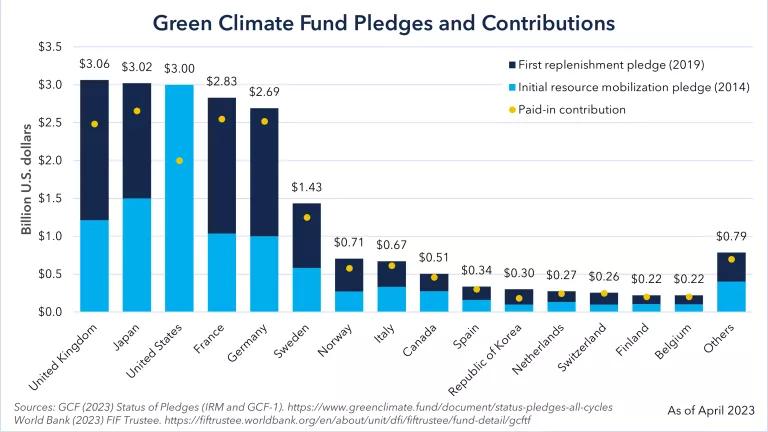U.S. Chamber of Commerce Opposes Climate Action That Corporate America Claims to Back
If slogans could fix the climate crisis, the Chamber would be all in. Instead, it’s saying one thing in public and something else on Capitol Hill.

If slogans could fix the climate crisis, the Chamber would be all in. Instead, it’s saying one thing in public and something else on Capitol Hill.
We’ve all seen those ads meant to convince consumers and investors that corporate America is stepping up to fight global climate change.
Why, then, just as Congress is working to do its part, is the U.S. Chamber of Commerce trying to kill the reconciliation bill we need to confront the climate crisis?
The Chamber is publicly threatening some members of Congress and warning them not to support the bill or they’ll lose the Chamber’s backing. Either the Chamber is out of step with the companies it lobbies for in Washington, or the companies aren’t shooting straight with the public.
It’s more than embarrassing. The Chamber is trying to anchor the economy to the dirty fuels of the past by blocking strategic investment in cleaner ways to power our future, drive growth, and create jobs.
Corporate America is singing a very different tune.
Under an initiative it calls “Priority Earth,” the parcel giant FedEx aims to become carbon neutral by 2040, a climate and sustainability goal the company calls “our most important delivery yet.”
The Pfizer pharmaceutical company calls its own sustainability effort the Green Journey, noting “the risks posed by global climate change” and calling on “industry, government, and the public” to help confront it.

A FedEx Express flight taking off from McCarran International Airport in Las Vegas, NV.
“Climate change is one of the most urgent issues impacting our world today, and we are committed to help tackle this global problem," the social media juggernaut Facebook writes of its own sustainability pledge. “Our vision is a just and equitable transition to a zero-carbon economy, where no one is left behind.”
A senior officer from each of these companies sits on the Chamber’s board of directors.
FedEx, Pfizer, and Facebook, though, are far from alone—and for good reason.
Climate change is inflicting rising costs and mounting dangers on the economy—as leaders of more than 400 U.S. companies pointed out last week, in a letter urging Congress to enact the robust climate provisions in the reconciliation bill. It would expand the clean energy sector that already employs more than 3 million Americans, in jobs that pay 25 percent more, on average, than the median wage.
Little wonder, then, that major corporations across the board have hired senior sustainability officers and produced their own strategies for fighting the climate crisis, in ways that largely mirror the objectives President Biden outlined in his Build Back Better agenda.
Amazon has pledged to become carbon neutral by 2040 and is investing $2 billion to help get there. Part of its push: buying the electric vehicles that Biden’s proposals would support.
United Airlines plans to cut its carbon footprint to zero by 2050; again, in part by relying on the very kinds of clean fuels and technologies the Build Back Better agenda would promote.
Walmart is one of the nation’s largest purchasers of wind and solar power, and it’s committed to 100 percent clean electricity by 2035, just as Biden's plan calls for nationwide.

Wind turbines in California
To get there, though, we need to make the strategic investments Biden has called for in his Build Back Better agenda. The reconciliation package is the legislative vehicle for doing that. And the Chamber is trying to block it.
Why? Because the bill would pay for these investments by asking profitable corporations and wealthy Americans to chip in their fair share to support the public interest in speeding the shift to electric cars, clean power plants, and advanced manufacturing technologies.
The Chamber’s opposition is out of touch with corporate ambitions. It’s tone deaf to the power of the low-carbon economy to drive equitable recovery, long-term growth, prosperity, and jobs. And it’s out of sync with the economic play of our lifetime—a staggering $30 trillion in the coming decades to be invested in the global clean energy shift.
The Chamber itself, for that matter, is saying one thing in public and something else on Capitol Hill. Under the heading “Inaction is not an option,” the Chamber sums up its climate advocacy with this appeal: “We call on policymakers to seize on an approach that rises to the challenge of climate change, leveraging business leadership and expertise, America’s energy edge, and our ability to innovate.”
The Chamber goes on to cite "the urgent need for action,” calling for policies that promote exactly the kinds of research and market-based innovations in efficiency, low-carbon power plants, modern batteries, and other advances that Biden’s agenda would support.
If slogans could fix the climate crisis, the Chamber would be all in. Instead, it’s trying to block the very action we need to fight the hazard and harm of the central environmental crisis of our time.
It’s worth asking, when you think about it, exactly who the Chamber thinks it represents.



